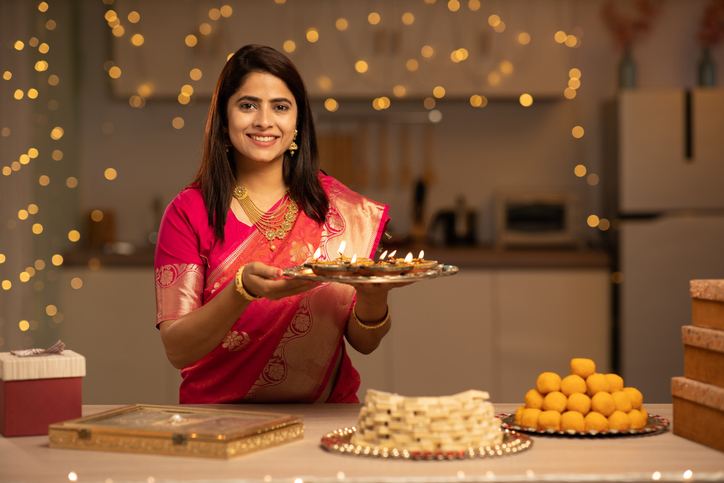

Diwali—the Festival of Lights—is more than a celebration. It’s a time when everything seems to sparkle: homes, hearts, and even words! ✨
As English learners, you can make your language shine just like the lamps of Diwali. The right words can help you express joy, warmth, and positivity—whether you’re writing a message, giving a speech, or simply wishing someone a bright celebration.
So today, let’s light up your vocabulary with 10 shiny English words that perfectly capture the beauty and spirit of Diwali.
Meaning: Bright, shining, and full of light.
Diwali is all about brightness—and “radiant” is the perfect word to describe it! You can use it for lights, faces, or even feelings.
Examples:
The radiant lamps filled the room with warmth.
Her radiant smile made the celebration even more joyful.
💡 Language tip: “Radiant” isn’t just about light—it can also describe happiness that shines from within!
Meaning: Shining softly and steadily.
“Gleaming” has a peaceful, calm feeling. Imagine a line of small lamps glowing gently in the evening breeze—that’s the magic of “gleaming.”
Examples:
The streets were filled with gleaming lights and cheerful decorations.
Each diya gleamed like a tiny star in the dark.
💡 Try this: Use “gleaming” for objects that reflect light—like glass, metal, or polished floors.
Meaning: Shining with little flashes of light; full of life and energy.
Diwali nights are often full of sparkle—both in the sky and in people’s eyes. “Sparkling” brings that energy to your English too!
Examples:
Children ran around with sparkling excitement.
The sky was filled with sparkling lights that looked like stars.
💡 Bonus idea: You can also use “sparkling” to describe someone’s personality—“a sparkling conversation” means lively and interesting talk!
Meaning: Giving out a steady, warm light; showing warmth or happiness.
This word is calm, comforting, and full of positive emotion. “Glowing” can describe both light and people.
Examples:
The room was glowing with golden lamps.
She gave a glowing smile as the candles were lit.
💡 Use it for compliments! Saying “You’re glowing today!” sounds natural and kind.
Meaning: Full of energy, color, and life.
Diwali is one of the most vibrant celebrations in the world—colors, lights, and sounds everywhere! “Vibrant” helps you describe that lively feeling perfectly.
Examples:
The market was vibrant with colors and festive music.
His words painted a vibrant picture of the celebration.
💡 Learning tip: “Vibrant” can describe people, places, and even sounds—so it’s a flexible word to use often!
Meaning: Filled with light or made bright.
If you’re talking about the magical glow of Diwali lamps, this is a wonderful word. It sounds elegant and peaceful.
Examples:
The pathway was beautifully illuminated with oil lamps.
Her thoughts were illuminated with kindness and hope.
💡 Smart English tip: You can also use it in a deeper way—“illuminated” can mean “enlightened” or “made clear.”
Meaning: Calm, peaceful, and untroubled.
While Diwali is bright, it also has moments of peace and reflection—lighting a lamp, making a wish, or spending quiet time with family. That’s where “serene” fits beautifully.
Examples:
The soft glow of candles created a serene atmosphere.
Everyone felt serene as they watched the lamps flicker.
💡 Language tip: “Serene” is great for describing calm feelings or quiet places.
Meaning: Full of joy and happiness.
“Joyous” is one of those words that instantly makes your sentence feel positive and uplifting. It’s perfect for festive occasions.
Examples:
The family enjoyed a joyous evening together.
The joyous laughter of children filled the air.
💡 Word upgrade: Use “joyous” instead of “happy” for a more expressive touch.
Meaning: Feeling thankful and appreciative.
Diwali isn’t just about lights—it’s about being thankful for love, peace, and new beginnings. “Grateful” adds emotional depth to your writing and conversations.
Examples:
I felt grateful for the togetherness this festival brings.
Let’s be grateful for every light that guides our way.
💡 Simple trick: Pair it with “heart” — “a grateful heart” sounds warm and sincere.
Meaning: Feeling or showing trust that good things will happen.
Every light we see during Diwali reminds us to stay hopeful. It’s one of the most meaningful words to use for the season.
Examples:
The glowing lamps filled everyone with a hopeful spirit.
Each spark of light was a reminder to stay hopeful for the future.
💡 Practice idea: Try writing a short paragraph or message using “hopeful” to describe your goals or dreams.
Here’s a quick and fun practice for you!
Use three of today’s shiny words in your own sentences. Try to describe:
A Diwali night scene
A special moment with family or friends
How you feel about the Festival of Lights
Example:
The night was radiant with lamps, and her joyous laughter made everything feel hopeful again.
Your turn! Write your sentences in your English notebook—or share them with friends to spread the brightness.
Each of these 10 words—radiant, gleaming, sparkling, glowing, vibrant, illuminated, serene, joyous, grateful, and hopeful—reminds us that language can shine just like light. 🌟
When you use expressive, positive vocabulary, your English becomes more beautiful and confident. These words aren’t just for Diwali—they can brighten your speech and writing all year round.
Imagine using them in your everyday messages:
“Your ideas are radiant.”
“I’m feeling hopeful about my new goals.”
“What a vibrant conversation we had today!”
Words, like lights, can transform any moment. So go ahead—let your English glow with positivity!
As we celebrate the light within and around us, let’s remember: every kind word we say is like a tiny lamp that brings warmth to someone’s day. 🌙
Keep learning, keep glowing, and let your English shine brighter than ever.
Happy Diwali from English with Janet! ✨

Leave a Reply